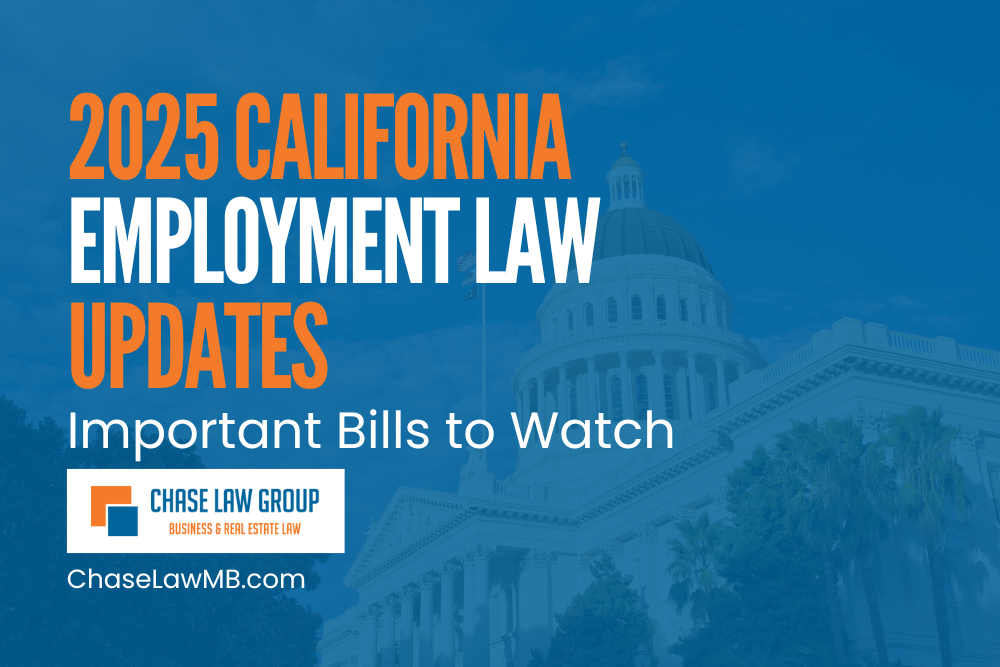2025 California Employment Law Updates: Important Bills to Watch
By Admin April 29, 2025 Category: Employment Tags: automated decision systems business law California bills california employment law California legislation chase law manhattan beach deann chase employee rights employment attorney employment reform equal pay Labor Law los angeles business attorney paid family leave pay transparency small business law wage equality wage theft worker safety workplace justice workplace surveillance

April was a busy month in Sacramento following legislators’ Spring recess. As the 2025 legislative session progresses, California lawmakers introduced several bills that could have a significant impact on employment law in the state. While it’s still early to determine which bills will move forward, these proposed changes could greatly influence how California employers operate.
Key Proposed Employment Laws
AB 1018: Regulating Automated Decision Systems
Assembly Bill 1018 seeks to regulate the use of automated decision-making systems, including artificial intelligence (AI) and machine learning, that influence hiring, promotions, performance reviews, and pay. Under this bill, employees would have the right to opt out of decisions made by these systems, ensuring greater transparency in the use of AI in employment practices.
AB 1331: Restrictions on Workplace Surveillance
AB 1331 would impose strict limits on workplace surveillance, including video/audio recording, electronic monitoring of work pace, and GPS tracking. The bill specifically prohibits surveillance in private spaces such as bathrooms, locker rooms, break rooms, and lactation areas, as well as outside of work hours or in employees’ personal vehicles.
AB 1371: Worker Safety and Task Refusal
AB 1371 proposes that employees be allowed to refuse assignments that violate safety standards or pose a reasonable risk of injury or illness. It also protects workers from retaliation by employers if they exercise their right to refuse dangerous tasks, ensuring that safety remains a priority in the workplace.
AB 1234: Overhaul of Wage Theft Complaint Process
Under AB 1234, the state’s Labor Commissioner would be required to schedule hearings for wage theft complaints within 90 days of filing. Additionally, the bill mandates that a decision be issued within 15 days following the hearing, streamlining the process for workers to resolve wage disputes efficiently.
AB 1015: Employee Training Certifications
AB 1015 offers employers more flexibility in meeting California’s workplace discrimination and harassment training requirements. The bill allows employees to submit certificates from prior training, provided the certificate is within two years, reducing the need for repeated training sessions.
SB 642: Employment: Payment of Wages
Senate Bill 642 updates pay transparency and wage discrimination laws by defining “pay scale” as a good-faith estimate of the expected wage range. It strengthens wage equality protections, extending the time to file discrimination claims to 3 years (4 years for willful violations) and treating discriminatory payments as a continuing violation. The bill also clarifies definitions of “wages,” “wage rates,” and “sex.”
SB 590: Expanding Paid Family Leave Eligibility
SB 590 aims to broaden the scope of California’s Paid Family Leave program, extending benefits to employees who need to care for a seriously ill individual with whom they share a close, family-like relationship. This bill would give more workers access to paid leave to care for loved ones beyond the current criteria, which already includes children, spouses, and parents.
SB 261: Penalties for Unpaid Wages
Senate Bill 261 introduces a civil penalty for employers who fail to comply with court judgments regarding unpaid wages. This bill aims to hold employers accountable for wage theft and ensure workers are compensated for their labor in a timely manner.
Looking Ahead
Currently, these bills are in various stages of review and discussion within legislative committees. To move forward, they must pass both the California Senate and Assembly before the legislative session ends on September 12, 2025. Following that, Governor Newsom will have until October 12, 2025, to either sign or veto the bills that make it to his desk.
Stay ahead of California’s evolving employment laws—whether it’s pay transparency, workplace surveillance, or paid family leave. Contact our employment attorney Scott Liner at [email protected] today if you have any questions about these new laws and/or the impact on your company.
Stay ahead of compliance issues with proactive legal strategies.
WWW.CHASELAWMB.COM
Contact Chase Law Group
310-545-7700
Please note that this article is for informational purposes only and should not be considered legal advice and does constitute an attorney-client relationship. It is recommended to consult with an attorney directly for specific guidance pertaining to your business and its practices.

